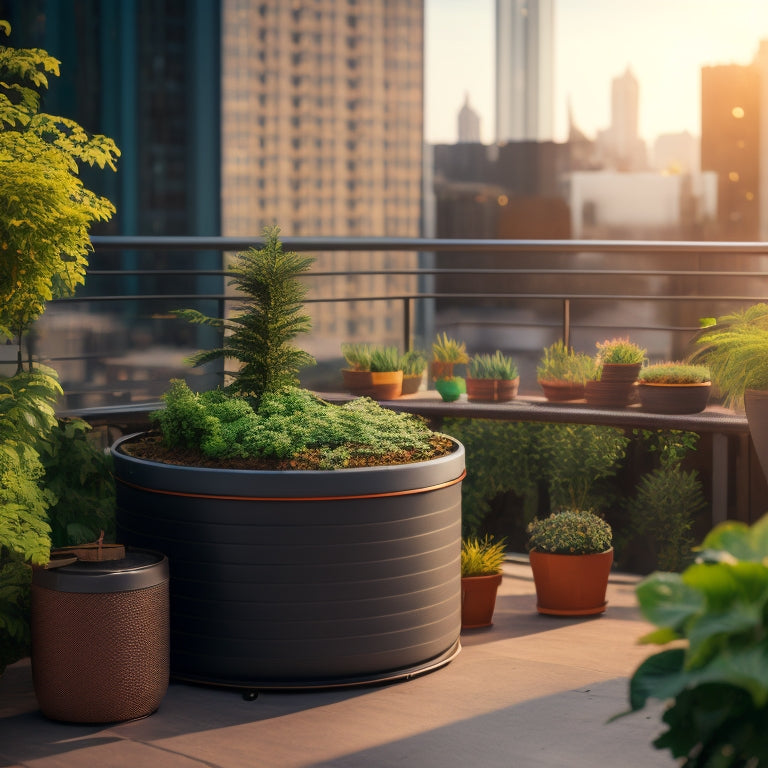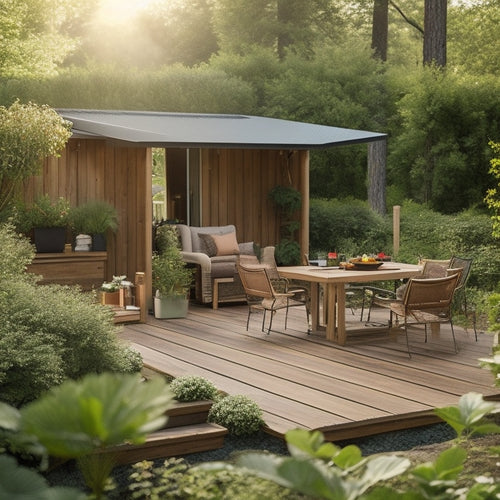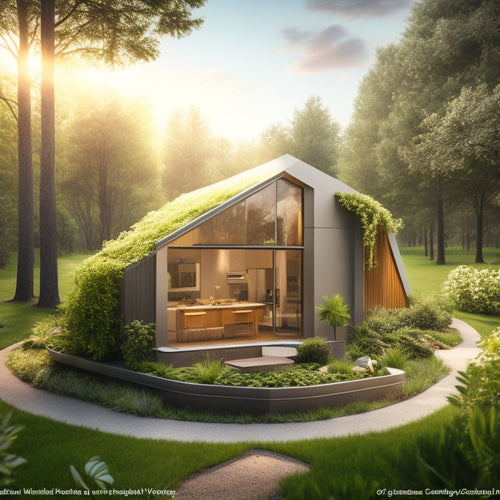
What Compact Composters Work Best for City Gardens?
Share
You can fit an efficient composting system into even the smallest of city gardens, thanks to compact designs that prioritize space-saving functionality and ease of use. For limited spaces, consider vertical composters that maximize wall space, worm composters that require only 1-2 sq ft, or bokashi composters that fit neatly into small areas. Each type has its benefits, such as odor minimization, fast decomposition, and low maintenance. By choosing the right compact composter for your city garden, you'll be on your way to turning kitchen scraps into nutrient-rich soil - and that's just the beginning of your composting expedition.
Key Takeaways
- Vertical composters are ideal for city gardens, offering space-efficient and odor-minimizing composting with easy maintenance.
- Worm composters provide fast decomposition and nutrient-rich output, requiring low maintenance and suitable for small spaces.
- Bokashi composters are compact, user-friendly, and fermentation-based, making them a great option for urban gardens.
- When selecting a composter, consider available space, maintenance level, and composting goals to ensure the best fit for your city garden.
- Compact tumblers and stackable trays are design features that prioritize aerobic digestion and flexibility in composting for city gardens.
Small Space Composting Essentials
When it comes to small space composting, every inch counts. You need to make the most of the space you have, and that means being intentional with your composting setup.
Start by collecting kitchen scraps in a dedicated bin or pail, and make sure it's easily accessible. This will encourage you to compost more frequently, which is key to reaping the composting benefits.
By integrating renewable energy sources, such as solar-powered energy systems, into your urban garden, you can further reduce your reliance on non-renewable energy sources and support a more sustainable lifestyle.
Composting reduces waste, creates nutrient-rich soil, and supports healthy plant growth. In a small space, it's especially important to prioritize these benefits, as they can make a big impact on your urban garden's productivity.
Best Composter Types for Cities
You're likely wondering what kind of composter will work best in your city garden, given the space constraints and unique challenges of urban gardening. The right container selection is essential to reap the composting benefits. Here's a breakdown of the best composter types for cities:
| Composter Type | Benefits |
|---|---|
| Vertical Composters | Space-efficient, odor-minimizing, easy to maintain |
| Worm Composters | Fast decomposition, nutrient-rich compost, low maintenance |
| Bokashi Composters | Fermentation-based, compact, easy to use |
When choosing a composter, consider your available space, desired maintenance level, and composting goals. By selecting the right composter, you'll be able to enjoy the composting benefits, such as reducing waste, creating nutrient-rich soil, and growing a thriving city garden.
Urban Composting Methods Compared
Now that you've selected the right composter for your city garden, it's time to investigate the various urban composting methods that'll help you turn organic waste into nutrient-rich soil.
You've got two main options: indoor composting and outdoor composting. Indoor composting is perfect for small spaces, using worm bins or bokashi systems to break down food scraps and coffee grounds. This method is ideal for city dwellers with limited outdoor space, much like how fast charging stations can quickly recharge EVs in high-traffic areas.
Additionally, just as energy storage systems enhance solar charging, a balanced mix of green and brown materials is essential for efficient composting.
Outdoor composting, on the other hand, involves larger composters that can handle more waste, but require more space and maintenance.
Whichever method you choose, make sure to balance green materials (food scraps, grass clippings) with brown materials (dried leaves, twigs) for best results.
Compact Composter Design Options
From vertical composters that fit snugly against walls to compact tumblers that spin effortlessly, compact composter design options cater to the space constraints of city gardens.
You'll find designs that optimize aerobic digestion, ensuring efficient decomposition. As companies like We Recycle Solar and ECS Refining pioneer responsible recycling, it's crucial to evaluate sustainable practices in every aspect of our lives, including composting.
Worm bins, for instance, provide a specialized environment for worms to break down organic matter. Some compact composters feature rotating drums, making it easy to mix and aerate the pile. Others have stackable trays, allowing you to add or remove layers as needed.
Evaluate your available space, desired maintenance level, and composting goals when selecting a compact composter design. By choosing the right one, you'll be well on your way to turning food scraps into nutrient-rich soil for your city garden.
Efficient Composting in Tight Spaces
When space is at a premium, efficient composting in tight spaces requires careful planning and attention to detail. You'll need to maximize every inch to turn kitchen scraps into nutrient-rich compost. Consider vertical composting options or compact worm bins that can fit under your sink or in a corner.
| Composting Method | Space Requirements |
|---|---|
| Vermicomposting (worm bins) | 1-2 sq ft |
| Bokashi Composting | 1-2 sq ft |
| Small Outdoor Composters | 3-4 sq ft |
| Indoor Composting Pails | 0.5-1 sq ft |
Frequently Asked Questions
Can I Compost Meat and Dairy Products in a Compact Composter?
You can't compost meat and dairy products in a compact composter, as they attract pests, create odors, and may not break down properly, but you can try bokashi or worm composting for these items, or opt for a larger outdoor composter.
How Often Should I Turn the Compost Pile in a City Garden?
You'll want to turn your compost pile every 7-10 days to maintain ideal compost frequency, ensuring efficient compost management and preventing nasty odors from taking over your city garden's small space.
Are Compact Composters Suitable for Balconies With No Floor Space?
You can still compost on your balcony with no floor space; consider wall-mounted or hanging space-saving solutions, perfect for balcony composting, which maximize vertical space and keep your outdoor area clutter-free.
Can I Add Pet Waste to My Compact City Compost Bin?
You can add pet waste to your compact compost bin, but consider the risks: pet waste can contain pathogens, so make certain your composter reaches high temperatures (130°F+) to kill bacteria, and turn the pile regularly for safe, healthy composting.
Do Compact Composters Attract Pests in Urban Areas?
Just like Odysseus traversing treacherous seas, you'll need strategies to outsmart pests in urban composting. You're wise to wonder if compact composters attract unwanted critters; the answer is yes, but with pest prevention strategies, you can overcome urban composting challenges and freely harvest rich, earthy goodness.
Related Posts
-

Green Deck Options: Earth-Conscious Choices for Your Home
You're looking for a deck that not only enhances your home's exterior but also aligns with your eco-friendly values. ...
-

Why Grow Up? Vertical Gardens Transform Urban Living
As you change your urban living space, you're not just growing up - you're bringing nature back into the heart of the...
-

10 Best Sustainable Waste Management Solutions for Green Homes
You're likely unaware that the average green home generates over 2 kilograms of waste daily, but with the right susta...


